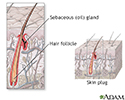Hot tub folliculitis
Hot tub folliculitis is an infection of the skin around the lower part of the hair shaft (hair follicles). It usually occurs when you come into contact with certain bacteria that live in warm and wet areas.
Hot tub folliculitis is caused by Pseudomonas aeruginosa, a bacteria that survives in hot tubs, especially tubs made of wood. The bacteria can also be found in whirlpools and swimming pools, or on contaminated water-associated objects such as gloves, towels, pool toys, or sponges.
Symptoms
The first symptom of hot tub folliculitis is an itchy, bumpy, and red rash. Symptoms can appear from several hours to 5 days after contact with the bacteria.
The rash may:
- Turn into dark red tender nodules
- Have bumps that fill with pus
- Look like acne
- Be thicker under swimsuit areas where the water was in contact with the skin for longer
Other people who used the hot tub may have the same rash.
Some patients may feel ill or have a fever or swollen lymph nodes.
Exams and Tests
Your health care provider can often make this diagnosis based on looking at the rash and knowing that you have been in a hot tub. Sometimes a culture or Gram stain may be done to identify the bacteria.
Treatment
Treatment may not be needed. The mild form of the disease often clears on its own. Anti-itch medicines may be used to ease discomfort.
In severe cases, your provider may prescribe an antibiotic.
Outlook (Prognosis)
This condition usually clears without scarring. The problem may come back if you use the hot tub again before it has been cleaned.
Possible Complications
In rare cases, a collection of pus (abscess) may form.
When to Contact a Medical Professional
Contact your provider if you develop symptoms of hot tub folliculitis.
Prevention
Controlling the acid levels and chlorine, bromine, or ozone content of the hot tub may help prevent the problem.
References
Araos R, D'Agata E. Pseudomonas aeruginosa and other Pseudomonas species. In: Bennett JE, Dolin R, Blaser MJ, eds. Mandell, Douglas, and Bennett's Principles and Practice of Infectious Diseases. 9th ed. Philadelphia, PA: Elsevier; 2020:chap 219.
James WD, Elston DM, Treat JR, Rosenbach MA, Newhaus IM. Bacterial infections. In: James WD, Elston DM, Treat JR, Rosenbach MA, Neuhaus IM, eds. Andrews' Diseases of the Skin. 13th ed. Philadelphia, PA: Elsevier; 2020:chap 14.
Review Date: 11/30/2022
Reviewed By: Ramin Fathi, MD, FAAD, Director, Phoenix Surgical Dermatology Group, Phoenix, AZ. Also reviewed by David C. Dugdale, MD, Medical Director, Brenda Conaway, Editorial Director, and the A.D.A.M. Editorial team.






